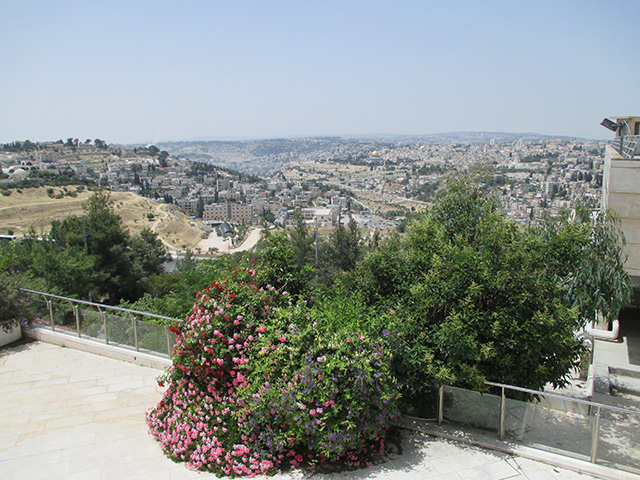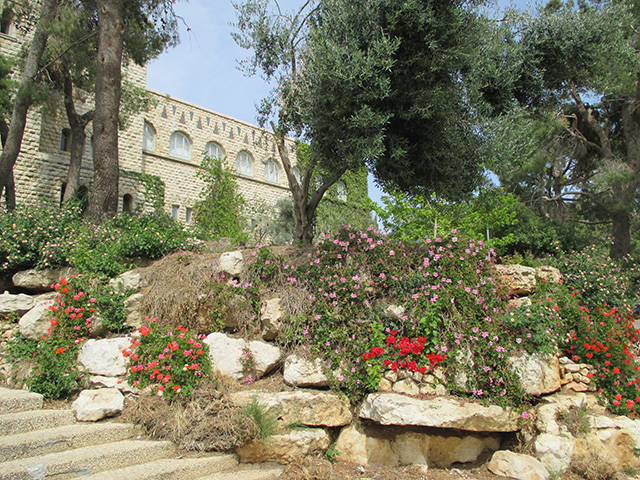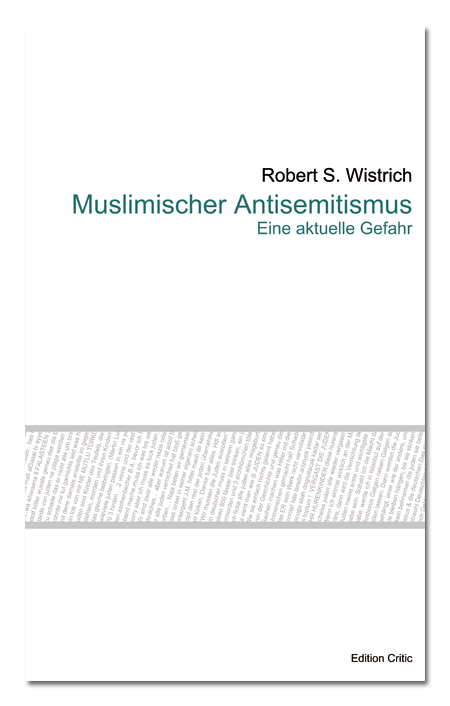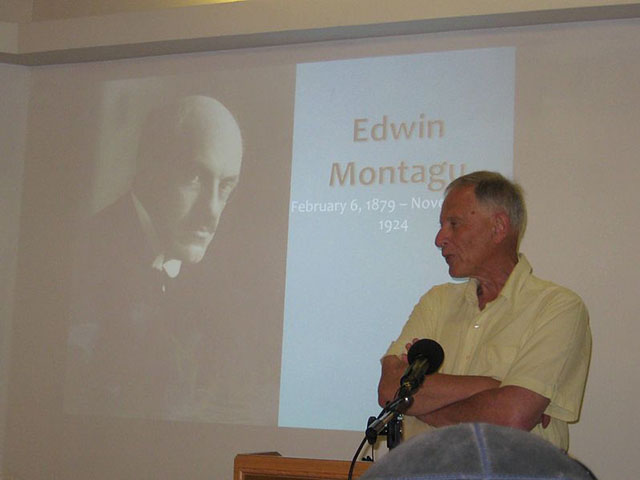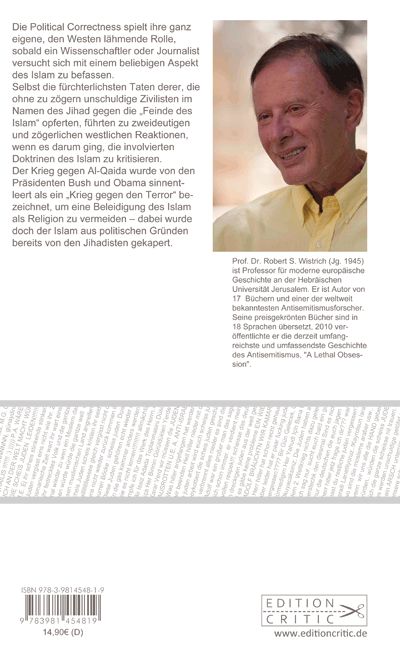Times of Israel, November 22, 2017
In these troubled days there is no inclination for a flowery introduction. No time for the flowers when 60,000 neo-Nazis march through the streets of Warsaw, flaunting Nazi salutes and promoting a “white” Poland while the minister of the interior applauds, when American neo-Nazis scream “Jews will not replace us” and a US President finds “fine people” among them, in a time when the first neo-Nazi party ever was elected to the postwar German Parliament, the Bundestag. All this in 2017.
Medias in res: Let’s be crystal clear – the pro-Israel camp in the US, Europe and Israel has a huge problem with right-wing extremism, racism, antisemitism and bigotry. Plain and simple.
During my time as a post-doctoral associate at Yale University in 2008-2009, I joined the chairperson of my center, the eminent scholar and dauntless campaigner for an academic response to resurgent antisemitism, Dr. Charles Small, founder of the Institute for the Global Study of Antisemitism and Policy (ISGAP), and another colleague for an event at the 92nd Street Y in New York City. There was an interesting debate going on with about “Radical Islam and the Nuclear Bomb.” Later, we had a vibrant discussion with Bret Stephens in a smaller circle. Now, Stephens works as a journalist for the New York Times and in a groundbreaking piece on November 16, 2017, he boldly critiqued the Zionist Organization of America (ZOA):
“The Zionist Organization of America feted Stephen K. Bannon at a gala dinner in New York on Sunday night. What a disgrace.
What a mistake, too. It’s a disgrace because no organization that purports to represent the interests of the Jewish people should ever embrace anyone who embraces anti-Semites. Jews have enemies enough.”
Stephens compares the Zionist Organization of America to the anti-Zionist Jewish Voice for Peace, and he does so quite rightly:
“But just as there are anti-Zionist Jews, there are also anti-Semitic Zionists.”
While the Zionist Organization of America hosts and praises the far-right’s hero of the decade, Steve Bannon, the Simon Wiesenthal Center (SWC), headquartered in Los Angeles, even prayed publicly in a PR extravaganza for a new president who is sexist, racist and a follower of antisemitic conspiracy myths.
The Middle East Forum’s (MEF) president Daniel Pipes left the Republican Party (GOP) after 44 years, due to the nomination of Trump. His statement, explaining why he left the GOP is truly important and much to the point:
“The Republican Party nominated Donald Trump as its candidate for president of the United States – and I responded by ending my 44-year GOP membership. Here’s why I bailed, quit, and jumped ship: First, Trump’s boorish, selfish, puerile, and repulsive character, combined with his prideful ignorance, his off-the-cuff policy making, and his neo-fascistic tendencies make him the most divisive and scary of any serious presidential candidate in American history.”
Pipes stands for an anti-Islamist position, distinguishing between Islam as a religion and Islamism as an ideology. Islamism and jihad are main threats to the Western world, to America, and the Jewish state of Israel. Supporting moderate Muslims is also important to the MEF and Pipes.
While Jewish anti-Zionists are very troubling these days, including their support for BDS, pro-Zionist Jewish bodies are of course not attacked by think tanks such as the MEF. However, that same Middle East Forum now goes ahead and supports an extreme right-wing German online page called “Journalistenwatch,” which is a trumpet for the Alternative for Germany (AfD), who’s then chairwoman Frauke Petry was very happy after the election of Trump. It was a big win for the extreme Right.
On November 9, 2017, the anniversary of the Night of Broken Glass in 1938, Journalistenwatch published an article by Max Erdinger (the article is signed by “ME”, which stands for Max Erdinger). It attacks Jews in Germany, namely former head of the Central Council of Jews in Germany (2006–2010) and former Vice-President of the World Jewish Congress (WJC), Charlotte Knobloch, for her stance against neo-Nazis in general and the extreme right-wing party “Alternative for Germany” (AfD) in particular.
The article blames the Central Council of Jews in Germany for their policies of remembrance for the Shoah. Charlotte Knobloch (85 years old), a Holocaust survivor, also works with the World Jewish Congress (WJC) on issues related to Holocaust remembrance. Journalistenwatch writes that Knobloch “agitates” against those who fight immigration and non-Germans.
They blame Knobloch for doing so while in Paris jihadist murder was going on. The accusation that she was silent on Muslim antisemitism, while Knobloch is among the best known critics of Muslim antisemitism, is part of the fake news plague of our time of Trumpism and right-wing extremist conspiracy myths.
Readers will soon learn just how active Knobloch and the Central Council of Jews in Germany are in fighting Islamist antisemitism.
Journalistenwatch says in Erdinger’s piece on November 9, 2017 that there must be “calculation” behind the behavior of Jews such as Knobloch and the Central Council of Jews in Germany in order to succeed in urging Germans to commemorate the Holocaust. What calculation? A Jewish conspiracy? That is an antisemitic resentment, aimed at Jews who urge non-Jews to remember the crimes of their forefathers and foremothers.
Journalistenwatch goes on to bemoan that it is
“not enough to visit concentration camp memorial sites. Then, we also need to talk about communism and socialism, about Stalin, Mao, PolPot, South Africa and the North Korean leader”.
That kind of Holocaust distortion is well-known in the field of research of antisemitism. When asked about Auschwitz, one answers with Stalin, and that is a clear case of antisemitism –
Why? Because the Red Army liberated Auschwitz, while the Germans had built it and killed and gassed some 1.5 million people there, among them 1.2 million Jews. Stalin’s own crimes have nothing to do with Holocaust remembrance. Yet, this typical reaction by ordinary Germans and their allies is part of today’s Holocaust distortion or “double genocide” ideology. The infamous Prague Declaration and the critique by eminent scholar and defender of history, Professor Dovid Katz from Lithuania, is a case in point.
At the end of the November 9 article by Journalistenwatch we find:
“Therefore, Central Council of Jews in Germany: finally, become honest or shut up your impertinent mouth.”
Jews who urge Germans to visit concentration camps, have an “impertinent mouth”? If that is not antisemitism, what is?
Does the Middle East Forum (MEF) and Daniel Pipes truly want to support a group like Journalistenwatch that is defaming the leading Jewish, Zionist and anti-Islamist body in Germany, the Central Council of Jews in Germany? The Central Council of Jews in Germany is the best-known Jewish voice in Germany when it comes to defending the Jewish state of Israel, to remembering the Holocaust, to protecting German Jews, and combating Muslim antisemitism, and right-wing, left-wing as well as mainstream antisemitism in all its forms.
Journalistenwatch obviously fights against the Jewish community in Germany, which is represented by the Central Council of Jews in Germany. Of course, they might find two or three extremist Jews, who share their resentment against the Central Council. We also have left-wing anti-Zionist Jews in Germany who like to defame the Zionist Central Council of Jews. There are diverse views, and highly fringe views, among all groups, but that is not the point.
For non-Jews in Germany, the Central Council of Jews in Germany is the core concept of “the enemy.” In 2002, extreme right-wing politician Jürgen Möllemann from the Libertarian Party (FDP) accused Ariel Sharon for killing children with tanks, and he attacked Michel Friedman for defending Israel and the Jews. At the time, Friedman was Vice President of the Central Council (May 2002), Möllemann had said on TV (Channel 2, ZDF), on May 16, 2002, that “Jews,” such as “Ariel Sharon or Michel Friedman,” “are responsible for growing antisemitism.” Today, Friedman, who is a public intellectual and journalist, is also anti-Nazi and anti-AfD, to be sure. Hatred of Friedman, and nowadays Charlotte Knobloch or today’s head of the Central Council, Josef Schuster, indicates hatred of the Central Council of Jews in Germany and this has not stopped, but only increased in the years to 2017. Journalistenwatch is a case in point.
Linguist and scholar of antisemitism, Professor Monika Schwarz-Friesel of the Technical University Berlin, in 2013 published a book, co-written with Jehuda Reinharz (former President of Brandeis University, from 1994–2010), dealing with 14,000 antisemitic letters to the Central Council of Jews in Germany and to the Israeli Embassy in Germany between 2002 and 2012. They underline that the Central Council of Jews is a core target for antisemites in Germany, including and most importantly, from the mainstream. Journalistenwatch clearly promotes that kind of hatred towards the Central Council.
The Central Council very often gives interviews or statements against different forms of antisemitism. On July 23, 2017, for example, Josef Schuster, gave an interview to the leading newspaper BILD, urging Muslim organizations to be more active against Muslim antisemitism. In an interview with RP online, May 15, 2017, Schuster argued against Muslim antisemitism as well as neo-Nazi antisemitism and he rejects the fantasy, that the AfD is pro-Jewish. On August 5, 2014, then head of the Central Council of Jews in Germany, Dieter Graumann, says the Jewish world in Germany feels “shock waves” after aggressive antisemitic rallies during the Gaza war, mainly from Islamists and Muslim antisemites.
After the jihadist attacks in Paris against the cartoonists at Charlie Hebdo and a Jewish supermarket in January 2015, in an interview with the Berlin based daily Tagesspiegel, January 24, 2015, Schuster argued vehemently against Muslim and Islamist antisemitism. On January 14, 2015, Charlotte Knobloch was quoted as saying she “fears Islamist terrorism”. After the jihadist massacre in Paris on November 13, 2015, where 130 civilians were killed by jihadists, including 89 people at a rock concert in the Bataclan club in downtown Paris, Knobloch, as head of the Israelite Community of Munich [Israelitische Kultusgemeinde München und Oberbayern], issued a statement the following day calling the outrage a “terror of a new dimension.” On November 18, 2017, Knobloch published an article in the mainstream Focus journal, urging Muslims and immigrants to stop preaching anti-Western ideology, including antisemitism and hatred of democracy and a Western way of life.
So much for the blatant untruths of Journalistenwatch that the Central Council of Jews in Germany and Charlotte Knobloch are unable or reluctant to deal with Muslim antisemitism or jihad. It’s just fake news, period.
Islamism, Muslim antisemitism and jihad are at the core of the work of the Central Council. But Journalistenwatch intentionally agitates against Jews such as Knobloch, because she does not share their extreme right-wing agenda.
Journalistenwatch can’t stand Charlotte Knobloch and the Central Council of Jews in Germany, because they stand for a pro-Israel agenda, for genuine Holocaust remembrance, and for a clear stance against neo-Nazism, right-wing extremism and the far-right AfD party.
This extremist agenda of the Far Right in Germany can be seen ever so clearly this month. In November alone, Journalistenwatch agitated against an anti-Nazi congress in Munich, to be held at the Munich chapter of the huge German Trade Union [Deutscher Gewerkschaftsbund, DGB], which has more than six million members. At that left-wing Antifa congress, the AfD and the right-wing extremist Pegida-movement (Patriots against Islamiziation of the Occident) joined forces and some 50-60 activists protested outside the 600 Antifa people who were a part of the congress.
One of the Pegida-counter protesters, who also joined the AfD event against the Antifa, was a certain Karl-Heinz Statzberger, as the Bavarian chapter of the German first TV channel, Bayerischer Rundfunk (BR), reports. Statzberger is a convicted neo-Nazi. He wanted to blow up the Jewish Community Center of Munich and was convicted for that crime; his sentence was four years and four months in jail, alongside with his fellow neo-Nazis, including Martin Wiese (seven years) and others.
Today, according to the German daily tageszeitung (taz), Statzberger supports the neo-Nazis of the “National Socialist Underground” [Nationalsozialistischer Untergrund, NSU], who since May 2013 face trial in Munich. The NSU killed at least 10 people between 2000 and 2006, among them nine immigrants and one police officer.
So much for the hapless pretense by Journalistenwatch that the AfD is not connected to neo-Nazis. Journalistenwatch reported about the events against the Antifa congress in Munich without mentioning the participation of a convicted neo-Nazi among the Pegida and AfD “protesters”. Instead, Journalistenwatch posted a video online by a speaker at the Anti-Antifa event, an AfD MP in the Bundestag, Wolfgang Wiehle, who spoke there on Nov. 4, 2017.
German foreign minister Sigmar Gabriel said prior to the election, that “real Nazis” will be standing at the speakers desk in Parliament, if the AfD is elected, and Minister of Justice Heiko Maas emphasized, that the party program of the AfD is “in part against the German constitution.”
AfD politician Beatrix von Storch claims that “Islam as such is a political ideology and not compatible with the German constitution.” That contradicts the distinction between Islam as a religion and Islamism as an ideology, made by Pipes and the MEF. The Huffington Post reported on May 27, 2013, about an event with Daniel Pipes about Islamism and Islam and the crucial distinction between Islam and Islamism. If all of Islam is Islamism, we would have lost. Israel would be lost, liberal Muslims couldn’t exist. But they do exist, as the event in Mississauga, a town near Toronto in Canada, where Pipes spoke, indicates. He was invited by a Muslim Committee against Antisemitism. The AfD rejects the core difference between Islam and Islamism.
In their party program of June 2016, the AfD rejects “minarets” in general, which violates freedom of religion and stands against the principles of the Middle East Forum, because, we assume, the MEF supports moderate Muslims, who might be among those who go into mosques with minarets.
In their program for the federal elections to the German Parliament, the Bundestag, on September 24, 2017, from April 2017, the AfD again rejected “minarets” as such. That, again, violates the German constitution and is set against the freedom of religion. Then, the AfD party program rejected also shechita (traditional Jewish slaughtering according to the laws of kosherness) in all its forms (see point 13.4 of their program). In particular they aim at “religious communities” and want to forbid shechita for them as well (nowadays, Germany allows shechtia for religious communities). Is the Middle East Forum against the freedom of religion?
Leading AfD politician Alexander Gauland said on September 2, 2017 at a meeting at the German nationalist symbol, the mountain Kyffhäuser in Thuringia, we should be “proud of two German armies in two World Wars” — including, in other words, the role of the German Wehrmacht in the Holocaust and the destruction of Poland, Belarus, the western Soviet Union and vast parts of Europe. Being proud of the German Army in the Second World War also includes pride for having killed American soldiers.
We are dealing here (most probably) with American donors to the Middle East Forum (MEF) that supported the page Journalistenwatch, which promotes and embraces the AfD, and Gauland is No.1 of the AfD in the German Bundestag, alongside with Alice Weidel. Giving money to an online news page that promotes and supports a political party, which is proud of German soldiers who participated in the Holocaust and also killed American and Allied soldiers who saved Europe from Hitler? Really? Journalistenwatch defends Gaulands pride in the German army of the Second World War!
Former head of the party Frauke Petry has reintroduced the Nazi word “völkisch” (“of the People” in a nationalist-racist conceptual framework) into the mainstream. It was a prime antisemitic term in Nazi Germany.
Other AfD politicians used Nazi slogans such as “Deutschland Erwache,” a slogan of the Storm Troopers (SA, Sturmabteilung), the SS (Schutzstaffel) and the Nazi Party (NSDAP). It is nowadays used on Twitter by Cologne AfD member Hendrik Rottmann, according to a report by the daily Die Welt. That slogan is illegal in Germany, as it resembles Nazi ideology (§86, 4 of the German Criminal Code, see report of the Saxonian chapter of the Federal Office for the Protection of the Constitution, report 2015, page 9). Journalistenwatch defends Rottmann.
Many AfD politicians share violent fantasies about hurting, hunting, torturing or killing left-wingers, the Antifa, Muslims, Jews, pro-abortion women etc. Journalistenwatch is promoting the AfD. Prior to his AfD membership Holger Arppe, an MP of the AfD in the northeastern state of Mecklenburg-West Pomerania, according to leading news site in Germany, Spiegel Online, wrote in a chat on March 17, 2012: “Perhaps we should kidnap [name’s] mother, brutally rape her on a daily basis by a chimp and then send [an acquaintance] a finger, day by day.”
Journalistenwatch trivializes the sick and violent fantasies of AfD-Arppe and equate this politician to Erdogan’s hostage in jail, German journalist Deniz Yücel, and his editor-in-chief of the daily Die Welt, Ulf Poschardt. For Journalistenwatch neo-Nazi-style Arppe, anti-Islamist Yücel, who is also critical of German nationalism, and his ally Poschardt are equally horrible. This kind of comparison is nothing but an insidious trivialization of violent fantasies of the Alternative for Germany’s personal (Arppe) and their loudspeakers (Journalistenwatch).
AfD MP in the Bundestag, Markus Frohnmaier, is working at a “German Centre for Eurasian Studies.” He is collaborating with right-wing extremist Manuel Ochsenreiter, editor of the journal “Zuerst.” Ochsenreiter wrote an anti-Israel book about “The Power of the Zionist lobby in Germany”, that was translated into Farsi with help of the Iranian Ministry of Culture, according to an article by exile Iranian, anti-Islamist and pro-Israel activist Kazem Moussavi. Frohnmaier is a spokesperson for AfD MP Alice Weidel, number one of the party in Parliament, together with Alexander Gauland. Journalistenwatch promotes Frohnmaier.
Journalist Esther Scheiner from Switzerland, who made aliyah to Israel several years ago, urges the Middle East Forum (MEF) to immediately stop supporting antisemitic and extreme right-wing groups such as “Journalistenwatch”, as she writes on a German language Israeli news site.
In 2015, for the first time, a German minister, Heiko Maas, Minister of Justice, spoke at the Israeli government sponsored Global Forum for Combating Antisemitism. Maas is a leading voice against neo-Nazism, right-wing extremism as well as the “Alternative for Germany (AfD).”
Support for Israel must be right in the mainstream, not a partisan project of neo-Nazis, who want a Jew-free Germany (and America).
American NGOs and think tanks, such as the Middle East Forum (MEF), might have reasonable concern about the failure of scholarship and activism when it comes to Israel and jihad, as the pro-Edward Said post-colonial mainstream would seem to indicate. Therefore, support for serious anti-Islamist scholarship and activism, as well as support for Zionist scholarship and activism is essential – but not support for those, who join Germany’s far-right antisemitic establishment in defaming German Jews like Charlotte Knobloch or the Central Council of Jews in Germany.
If NGOs or think tanks support such extreme right-wing groups, they do not just harm Israel and Jews in Germany, they even work against their own commitment to protect American values and interests. Since when has it been an American interest to support German neo-Nazi style agitators who endorse a party, the Alternative for Germany (AfD), which is “proud of German soldiers in two World Wars,” including the Wehrmacht in the Second World War and the Holocaust, and the killing of American soldiers? Since when do donors or members of boards of governors support such German neo-Nazi type groups?
They would do better to listen to Bret Stephens in the New York Times:
“If Israel is going to retain mainstream political support, it cannot allow itself to become the pet cause of right-wing bigots and conspiracy theorists. That requires putting serious distance between Bannon and every pro-Israel organization, to say nothing of the Israeli government itself, by refusing to provide a platform for him and his ilk. Personal and national reputations alike always depend on the company one keeps. Not every would-be supporter deserves consideration as a friend.”
The very same far-right people in the pro-Israel camp also should listen to historian Martin Kramer from the Shalem College in Israel: in an article in Mosaic Magazine, November 6, 2017, he emphasizes the pro-Zionist role of Stalin, Gromyko and other Soviet politicians and diplomats in the years 1947–1949. Without Gromyko, Israel might not have had a diplomatic chance, as US President Truman was not at all as Zionist as many American Jews still like to believe. Stalin was much more pro-Israel at that time, and Stalin was the one who defeated the Germans and who liberated Auschwitz. Without Czech weaponry and Soviet help, Israel would probably not have survived the War of Independence.
Why remember that? Because bipartisanship is at the core of Zionism. Jews and Zionists depended on capitalists and communists to make Israel happen. In Germany, many of the often-defamed Antifa are anti-Nazi and pro-Israel, while the self-declared pro-Israel far right is antisemitic.
Zionists and Jews do not depend on neo-Nazis to defend them, to be sure.
At the end of the day, neo-Nazis want to kill the Jews. However, too many well-meaning pro-Israel Jews, many quiet naive, still don’t get it.
Today, many people in the pro-Israel camp defame Zionist left-wingers and defame every kind of reasonable criticism of Israeli policies or poor pro-Israel advocacy in Germany or other countries. Many simply deny that there are troubling tendencies in Israeli political culture. We do not ignore Arab, Palestinian and Islamist antisemitism, of course. The Arab rejection of the UN partition plan from November 1947 was a historical mistake. It is not the one and only problem, though. The occupation after 1967 is a problem, too, no doubt about this. Just ask David Ben-Gurion.
Some rightwing Zionists in countries such as Germany and America defame Israeli liberals while lionizing pro-fascists such as Bannon. Some would like to forget that President Trump did not mention Jews in his special message for Holocaust Remembrance Day, January 27, 2017, an omission that is not “accidental” in the current state of discourse.
Bret Stephens continues in the New York Times:
“The second reason is that political support for Israel is too important to tarnish through association with the likes of Bannon or European kindred spirits such as Holland’s Geert Wilders or Hungary’s Viktor Orban. Israel is not a latter-day Crusader kingdom holding out against a 21st-century Mahometan horde. It is a small democracy trying to uphold a set of liberal values against autocrats and religious fanatics sworn to its destruction. Zionists love Israel because of the way in which it brings together the values of individual freedom and Jewish civilization, not because of some blood and soil nationalism.“
Therefore, we strongly urge the Middle East Forum (MEF) to stop supporting extreme right-wing groups such as “Journalistenwatch” in Germany, and all other groups that harm the Jewish state of Israel, defame left-of-center Zionism, or Jewish bodies such as the Central Council of Jews in Germany. They must stop supporting groups that agitate against all immigrants and Muslims and reject any distinction between Islam and Islamism, reject Holocaust remembrance and praise the German (or Lithuanian or Hungarian, or Ukrainian etc.) armies and units who were involved in perpetrating the Holocaust.
It is all common sense. We need to step back and soberly assess the unique and disturbing combinations and juxtapositions of 2017.
An earlier, much shorter version of this article was published in The Times of Israel (TOI) blogs on November 18, 2017. The German online news blog “Journalistenwatch” complained and told TOI that their author McMahon was not quoted correctly from an October 2017 article. In fact, I did not at all refer to that article. I referred rather to an article from November 9, 2017, as indicated in the text. In any event, TOI deleted my article and sent it back (without asking me if I had quoted that October 2017 article, which I had not). Falsification of fact to undermine honest discourse is alas a hallmark of “Journalistenwatch” and hopefully major international Jewish journals and portals will stand their ground firmly.
The author, Clemens Heni, Ph.D., wrote a M.A. thesis in 1999 (at Bremen University) about the relationship of Germany, antisemitism and the Holocaust, comparing Daniel J. Goldhagen’s (Harvard) study “Hitler’s Willing Executioners” (1996) to Critical Theory’s masterpiece “Dialectic of Enlightenment” by Max Horkheimer and Theodor W. Adorno (1944/47); in January 2001 (during the second Intifada), he was a co-author of a brochure about left-wing anti-Zionism in Germany, based on the antisemitic hijacking by left-wing Germans of the Revolutionäre Zellen (RZ) and Palestinians of an airplane in June/July 1976 to Entebbe (Uganda), where Benjamin Netanyahu’s elder brother Yoni was killed; in 2006 he received his Ph.D. at the University of Innsbruck (Austria, “summa cum laude”) with a study (509 pages) about political culture and the New Right in German political mainstream from 1970–2005; in 2008/09 he was a Post-Doc Associate at Yale University (Yale Initiative for the Interdisciplinary Study of Antisemitism, YIISA), doing a study about German antisemitism, including the Nazi time and post-Holocaust antisemitism (332 pages); in 2011 he published a study about Islamic Studies and Antisemitism in Germany after 9/11 (410 pages, in German, supported by the Middle East Forum, MEF); in 2013 he published his study “Antisemitism: A Specific Phenomenon Holocaust Trivialization – Islamism – Post-colonial and Cosmopolitan anti-Zionism” (648 pages; review in the Middle East Quarterly by the MEF in 2017); in 2014 he did a book (177 pages, in German) about “Critical Theory and Israel. Max Horkheimer and Judith Butler, Judaism, binationalism and Zionism” (lecture at ISGAP in April 2014); 2017 he published a collection of essays (in German, 262 pages) about German nationalism, racism and antisemitism, entitled “An Alternative towards Germany” (also as an E-Book); Heni is director of the Berlin International Center for the Study of Antisemitism (BICSA), founded in 2011; since 2016 BICSA organizes the Robert S. Wistrich (1945–2015) Memorial lectures (on May 19); 2011 BICSA published Wistrich’s brochure “Muslim Antisemitism” (American Jewish Committee, 2002) in a German translation, 2015 BICSA published a second edition of Wistrich’s groundbreaking “Hitler’s Apocalypse” from 1985, including his analysis of the Islamist threat; 2017, BICSA translated (Clemens Heni and Michael Kreutz, 456 pages) the book “The Israeli Nation-State,” co-edited by Fania Oz-Salzberger and Yedidia Z. Stern, into German; Since May 2016, Heni is editor-in-chief of the Journal of Contemporary Antisemitism (JCA) by Academic Studies Press, Boston, MA.


